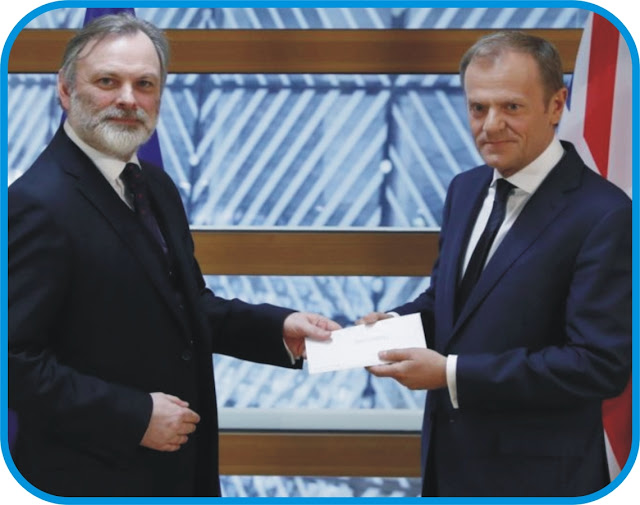Several months after the British people voted to leave the
European Union, the Prime Minister Theresa May has finally triggered the long
waited Article 50 yesterday to begin the negotiation process which is expected
to last for at least two years.
After receiving the formal notification from the UK, the
Commission’s President Donald Tusk wrote on his twitter handle saying:
"After nine months the UK has delivered. #Brexit."
Kicking off the two-year process of withdrawal from the
European Union, Theresa May told MPs: "This is a historic moment from
which there can be no turning back." Saying it was "a day of celebration
for some and disappointment for others".
However she added: "Now is the time for us to come
together, to be united across this House and across this country to ensure that
we work for the best possible deal for the UK and the best possible future for
us all."
She promised to convey "the democratic will of the
British people" and to take the "unique opportunity" to
"shape a brighter future" for the UK, adding: "I choose to
believe in Britain and that our best days lie ahead."
The PM in her speech struck a note of appeasement, maintaining:
"We are leaving the European Union, but we are not leaving Europe - as we
want to remain committed partners and allies to our friends across the
continent."
Then she said a UK exit without a deal "is not the
outcome that either side should seek".
Mr Tusk addressing at a news conference shortly after being
handed the Article 50 notice: "There is no reason to pretend that this is
a happy day, neither in Brussels nor in London.
"After all most Europeans, including almost half the
British voters, wish that we would stay together, not drift apart.
"But, paradoxically, there is also something positive
in Brexit.
"Brexit has made us, the community of 27, more
determined and more united than before."
And in a personal message to Britain he added: "We
already miss you. Thank you and goodbye."
On the other hand, despite the triggering of Article 50, the
European Commission, Council and Parliament have signalled that "EU law
must apply until Brexit day" - when Britain officially leaves.
In line with Theresa May’s desire to settle the issue of residency
from both parties, the European Parliament, which can veto a UK-EU deal, is expected
next week to make the guarantee of full EU citizen rights a red line.
Theresa May is seeking to simultaneously negotiate a fresh deal
with the EU at the same time with divorce settlement, but such a plan is being
rejected by the EU saying, for any fresh deal to be struck, the UK must first
of all leave the union officially.
Angela Merkel in particular has refused Mrs May's request
for negotiations on Britain's withdrawal to run alongside talks on a trade
deal.
The German Chancellor said: "The negotiations must
first clarify how we will disentangle our interlinked relationship... and only
when this question is dealt with, can we, hopefully soon after, begin talking
about our future relationship."
After the triggering of Article 50 Nigel Farage announced
that "Today's the day the impossible dream came true. I'm delighted,"
while enjoying a pint in central London.
North of the English border, however, a day after MSPs
backed a second Scottish independence vote, First Minister Nicola Sturgeon
tweeted ahead of the declaration: "Today, the PM will take the UK over a
cliff with no idea of the landing place. Scotland didn't vote for it and our
voice has been ignored."











No comments:
Write comments